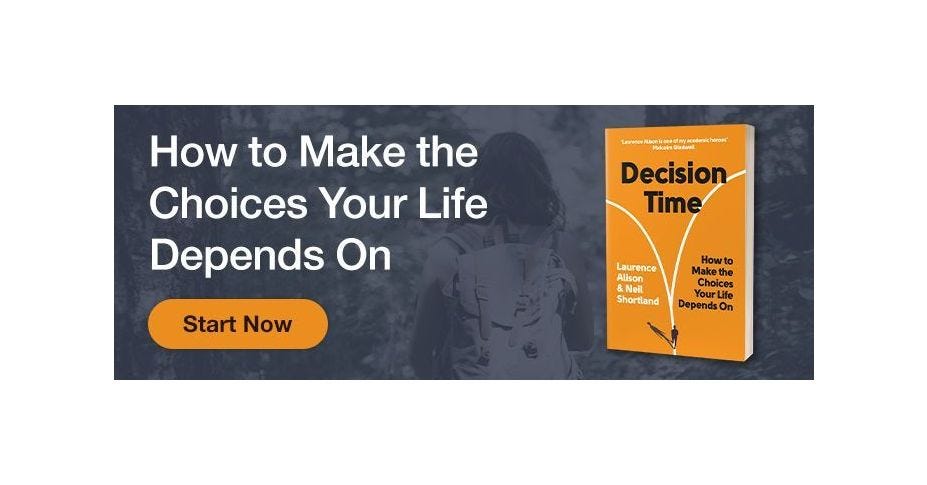Over the past few years, we have conducted laboratory and field experiments with thousands of people to identify the personality traits that define the best decision-makers. From soldiers and police officers to samples of everyday decision-makers, the most interesting predictor of who we have found for is a good decision-maker may surprise you. It’s that the most powerful personality variable we’ve found useful has nothing to do with a military mindset or experience handling a situation with high stakes. Instead, it links to how hard we find it to choose a movie, whether to switch a radio station, and whether to throw away food in the fridge that’s a day past its sell-by date.
The questions above all relate to the tendency to try to maximize the outcomes of a given situation. It may sound unintuitive, but often it is the quest to make the very best out of a decision, and a fear of avoiding any loss, that places us at the greatest risk of making a bad decision (or no decision at all!). This is the personality trait of maximization.
We can show the process of maximization through a classic everyday experience of parking a car. I want you to imagine that you pull into a car park at your local supermarket, and as you pull into the car park you see a space, nice and open, with no cars nearby. But something inside of you makes you want to keep going to find a ‘better’ space. So, on you go, convinced that just up ahead there will be a nice open parking space right by the door to the store. A few seconds extra driving, for a much shorter walk. Alas, as you get up to the door, you find that the space you hoped was empty has a small car already parked there. You turn back around, only to see another car pulling into the space you drove past and now you must park even further away than before.
We have just seen maximization in action. Maximisers are those who seek to constantly make the best of a choice. Maximisers want things to be ideal, but research shows that maximisers have lower levels of happiness with their decisions, are more prone to regret, less optimistic, greedier, and are more neurotic than people who have lower expectations. Our research has found that, in military settings, maximisers are less effective decision makers: they find it harder to make a choice, and they tend to take longer – and taking a long time in a military setting can often mean failure.
Satisficers (the opposing end of the spectrum to maximizers) on the other hand are better able to settle for an option that is ‘good enough’. And, in contrast, being someone who can settle with less often gets you more.
So, how do you know if you are a maximiser? Well, there are multiple scales that you can use – but you can get a sense by reading the following statements and asking yourself how much each of them reflects your experiences:
- I often fantasise about living in ways that are quite different from my actual life.
- When shopping, I have a hard time finding clothing that I really love.
- I never settle for second best.
- I regularly agonise over decisions.
- I always read the whole menu when dining out.
- Whenever I’m faced with a choice, I try to imagine what all the other possibilities are, even ones that aren’t present at the moment.
If you found yourself agreeing with most of these questions, you are showing traits of a maximiser.
Now it is clear to note that being a maximizer is not necessarily a bad thing! Many decisions require maximization – buying the right house, buying the right car, picking the right college. But sometimes, especially decisions that involve uncertainty, emotion, or leaps of faith – trying to maximize can hold you back and your efforts to make the most of something may be making things worse. We cannot always find the perfect job, we often cannot leave a relationship without causing some harm, we can’t often elect for a medical procedure without embracing some risk. This is what the philosopher Alan Watts referred to as a ‘backwards law’; the idea that the quest for one thing can create the opposite outcome and the desire for a more positive experience is itself a negative experience.
So, what is important is knowing when you should maximize and when you should not. And in those instances when you do not have the luxury to maximize, be self-aware of your tendencies and override them. So next time you face a big decision and find yourself struggling, ask yourself if your quest to maximize the situation is standing in the way of you making the most of the situation. And if so, don’t be scared to embrace some negativity to make sure you maximize that which you really want. We teach you how to do that in the next blog in this series!
- Neil Shortland and Laurence Alison, author of Decision Time

